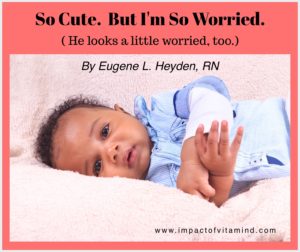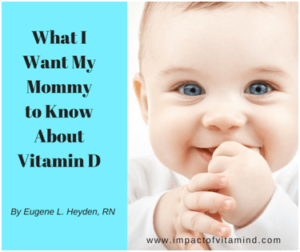Last update: 08-19-22
By Eugene L. Heyden, RN
Last fall I was invited to be the lead author of a “scholarly” paper discussing vitamin D and reproductive issues, for possible acceptance by a major research publication. Writing in “scholarly mode” is not what I’m used to. I’m used to fun! Well, fun doesn’t cut it for the scientific and health care community. Since I did not want this opportunity to pass, I eagerly accepted the challenge, put on my scholarly hat, and began reading tons of papers and writing thousands of words. The first draft took a number of weeks, and with the invaluable contributions of my co-author, and a going back and forth many times between us to get things right, a finished product emerged several weeks later. The article was submitted to and accepted by Journal of Steroid Biochemistry and Molecular Biology, under the title Vitamin D: Effects on human reproduction, pregnancy, and fetal well-being. About 8 months later, it is now in print. I am, understandably, thrilled. “Congratulations, Gene!” (I said this to myself repeatedly, and still do.) Would you like to read the article? You can. A link will be provided momentarily.
Now about my co-author: He is an impressive gentleman. You can meet him by following this link: https://www.visualcv.com/sunil-wimalawansa-md-phd-mba. He is a Former Chief of Endocrinology, Metabolism & Nutrition and Professor of Medicine, and served in this capacity for over 20 years. He also served for several years as Professor and Chief of Endocrinology at Robert Wood Johnson Medical School, New Brunswick, New Jersey. He is also the President & Chair, Board of Directors of several non-profit organization. There are more achievements I could mention here, a lot more, but we don’t have all day. Dr. Wimalawansa has authored or co-authored several hundred research publications. A partial list of his publications appears here: Dr. Sunil J. Wimalawansa (0000-0003-1096-8595) (orcid.org). Apparently, he never sleeps.
Back to the article in question. This article tells the story of the crucial role vitamin D plays in the very beginnings of life—fertilization, implantation, normal placental development, and proper fetal development. Of course, maternal vitamin D deficiency threatens all this, and can lead to infertility, pregnancy loss, preeclampsia, and abnormal fetal well-being. The negative effects of maternal vitamin D deficiency may extend beyond birth. Autism serving as an example.
You may be a little afraid of a “scholarly” research paper. But you don’t need to be, at least not this one. It is easy to read. I think you will enjoy it and find it well worthwhile. To read, click here: Vitamin D: Effects on human reproduction, pregnancy, and fetal well-being. Unfortunately, this article is not available free of charge. However, my co-author and I wrote a similar article (just for you) that is available without cost. Check it out! Vitamin D Deficiency-Related Reproductive Consequences.
Related articles
Disclaimer: This article is presented solely for informational purposes. The information contained herein should be evaluated for accuracy and validity in the context of opposing data, new information, and the views and recommendations of a qualified healthcare professional, and is not to be substituted for professional judgment and guidance or to provide reason to neglect or delay appropriate medical care. It is the reader and reader only who bears the responsibility for any actions that could be construed as being a response to the information contained herein. The statements and opinions expressed by the author have not been reviewed or approved by the FDA or by any other authoritative body, nor is the author endorsing any product or specific therapy. This article is offered to the reader to broaden his or her understanding of the issues discussed and to help identify options that may be suitable for the individual to pursue, on behalf of self or others, under approval and direction of a qualified physician. The author and publisher offer no guarantees of the accuracy or validity of the quotations incorporated into this article or the accuracy or validity of the information presented by the references used in this article.
Copyright © 2018-2022 Eugene L. Heyden, RN
All Rights Reserved

DISCLAIMER: The book excerpts and articles featured on this website are offered solely for informational purposes. The information contained therein should be evaluated for accuracy and validity in the context of opposing data, new information, and the views and recommendations of a qualified health care professional, and not to be substituted for professional judgment and guidance or to provide a reason to neglect or delay appropriate medical care for self or for others. It is the reader and reader only who bears the responsibility for any actions that could be construed as being a response to the information presented. The statements and opinions expressed by the author or authors of the information provided on this website have not been reviewed or approved by the FDA or by any other authoritative body, nor is the author endorsing any product or specific therapy mentioned. The book excerpts, articles, statements, and opinions are offered to the reader to broaden his or her understanding of the issues discussed and to help identify options that may be suitable for the individual to pursue, on behalf of self or others, under approval and direction of a qualified physician or medical team member. All questions of a medical nature which arise from the book excerpts and articles available on this website should be directed at qualified health care professional.













